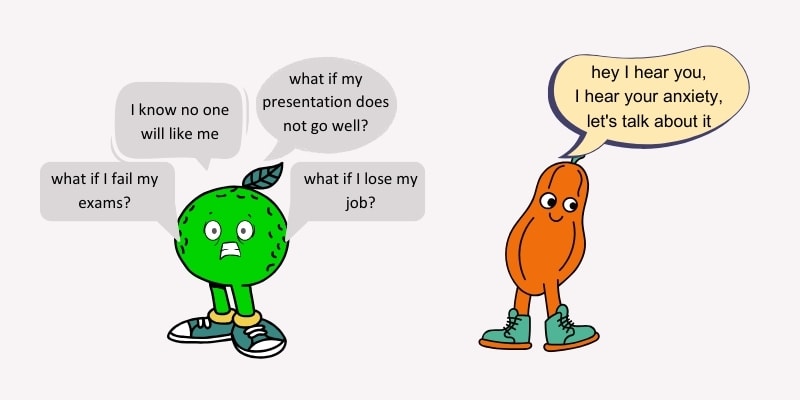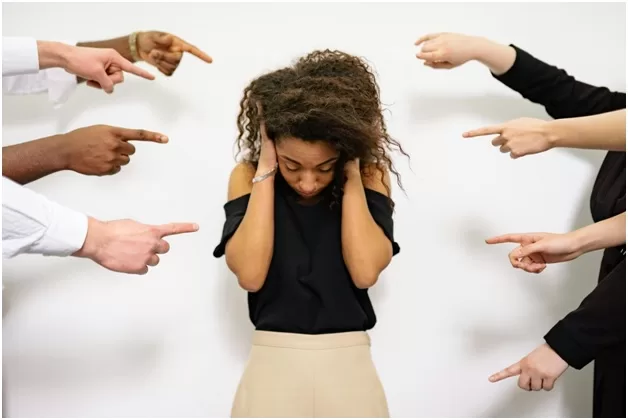Efficient Strategies in Coaching for Stress And Anxiety Disorder: A Course to Healing
When facing anxiousness conditions, you could feel unsure and overloaded of where to turn. Efficient counselling strategies can lead the way for recuperation, offering you with the devices to navigate your obstacles. From cognitive-behavioral techniques to mindfulness techniques, each method offers special benefits. Recognizing how these methods collaborate can make a considerable distinction in your journey. What are the essential parts that will guide you towards lasting change?
Recognizing Anxiety Conditions: A Comprehensive Introduction
It's essential to recognize that they encompass a range of conditions characterized by excessive worry or concern when you think concerning anxiousness disorders. These disorders can manifest in various means, including generalized stress and anxiety condition, panic condition, and social stress and anxiety condition. You may experience signs like rapid heartbeat, sweating, or trouble focusing. It prevails to feel overwhelmed, and these sensations can interfere with day-to-day life.Understanding the source of stress and anxiety is crucial - counselling for anxiety. They can originate from genetics, brain chemistry, or ecological aspects. You might discover that certain situations cause your stress and anxiety, making it crucial to determine these triggers
Cognitive Behavioral Therapy (CBT): Improving Thought Patterns
Cognitive Behavior Modification (CBT) supplies powerful tools for reshaping the idea patterns that contribute to anxiety conditions. Via CBT, you'll discover to identify and challenge negative ideas that fuel your anxiousness. Instead of allowing concern dictate your actions, you'll work with reframing those thoughts into more favorable, reasonable ones. This process aids you break the cycle of anxiousness by altering how you view situations.You'll likewise develop coping approaches to handle anxiousness in real-time. By practicing direct exposure techniques, you'll gradually encounter your anxieties in a controlled fashion, decreasing their power over you. In addition, you'll acquire skills to problem-solve and navigate difficult scenarios much more effectively.CBT is structured and ambitious, which means you'll see development as you use what you learn in therapy to your every day life. With commitment and method, you can markedly minimize your anxiousness and improve your total health.
Mindfulness and Relaxation Techniques: Cultivating Present-Moment Understanding
Mindfulness and leisure strategies help you grow present-moment recognition, allowing you to handle stress and anxiety more properly. By concentrating on the right here and currently, you can damage devoid of the cycle of fear and rumination that frequently fuels stress and anxiety. Start by practicing deep breathing exercises. Inhale slowly through your nose, hold for a moment, after that exhale with your mouth. This basic strategy can relax your mind and body.Engage in mindfulness reflection by establishing apart a few minutes each day to observe your thoughts without judgment. Focus on your breath, sensations, and the sounds around you. You may additionally locate worth in modern muscular tissue relaxation, where you tense and unwind each muscle mass group, advertising physical and mental ease.Incorporating these techniques into your day-to-day routine can produce a greater feeling of control, lower stress and anxiety symptoms, and boost your total well-being. Bear in mind, consistency is essential to experiencing the advantages.
Direct Exposure Therapy: Facing Anxieties Slowly
Exposure therapy aids you encounter your concerns slowly, enabling you to build self-confidence gradually. By utilizing progressive exposure strategies, you can gradually face what makes you nervous while establishing efficient coping mechanisms. This process not just decreases your fear yet additionally empowers you to manage anxiety better.
Steady Exposure Techniques
You can successfully decrease anxiousness and regain control over your life when you face your worries slowly. Progressive direct exposure methods include facing your worries tip by action, starting with much less frightening scenarios. You could start by imagining the been afraid scenario, after that progress to checking out photos or video clips associated with it. At some point, you can exercise confronting the worry in the real world, however only when you feel all set. This approach permits you to construct self-confidence as you relocate via each phase. Bear in mind to speed yourself; hurrying can boost stress and anxiety. Celebrate tiny victories in the process, as each advance empowers you. By continually applying these techniques, you'll find that your anxieties start to shed their grasp on your mind.

Building Coping Mechanisms
Building effective coping devices is essential for managing anxiety, especially as you encounter your concerns slowly with direct exposure treatment. Begin by determining your particular worries and breaking them down right into convenient steps. This way, you can gradually challenge each concern without ending up being overwhelmed. If you have a hard time with social situations, beginning by exercising small communications, like greeting a neighbor.Alongside steady direct exposure, incorporate leisure techniques such as deep breathing or mindfulness to relax your mind before encountering triggers. Keep a journal to track your progression and celebrate tiny victories. Border yourself with supportive friends or a specialist who can direct you. Bear in mind, it's a trip-- persistence and persistence will certainly enhance your coping mechanisms, leading to better durability versus stress and anxiety.
Helpful Therapy: Building Trust and Connection
To efficiently sustain somebody with anxiousness, developing count on and connection is necessary from the very first session. You'll want to develop a safe area where they really feel comfy sharing their ideas and sensations without judgment. Energetic listening is key; show real interest in what they share. Acknowledge their feelings and verify their experiences. It is necessary to be understanding, as this assists construct a link and urges openness.Be regular in your technique and preserve privacy to additional strengthen that count on. Use open body language and make eye contact to convey your listening. Bear in mind, your persistence goes a lengthy method; building relationship takes some time, and it's important to respect their rate. By promoting this supportive setting, you'll equip them to engage even more completely in the healing procedure, making it read what he said simpler for them to explore their anxiousness and work toward recuperation.
Group Therapy: Shared Experiences and Cumulative Healing
Team therapy can be an effective tool for those dealing with anxiousness conditions, as it enables individuals to share their experiences and locate relief in the understanding of others. In this helpful atmosphere, you can reveal your feelings without fear of judgment. Hearing others' tales can normalize your own experiences, making you feel less alone in your struggle.Participating in group therapy aids you develop coping approaches through shared understanding and understandings. As you pay attention to others, you may find brand-new means to tackle your anxiety that you hadn't taken into consideration before.Moreover, the cumulative healing that happens in these sessions can cultivate a feeling of community, reminding you that you're not encountering your difficulties alone.Building links with others that comprehend your struggle can boost your self-confidence and inspiration to confront your anxiousness. Team therapy creates an area where development and healing come to be a shared trip, encouraging you to take steps toward recuperation.
Incorporating Lifestyle Modifications: All Natural Methods to Stress And Anxiety Monitoring
While treatment offers crucial support, integrating way of living adjustments can significantly improve your capability to take care of anxiety - counselling for anxiety. Start by including normal exercise into your regimen. Workout launches endorphins, which can elevate your mood and minimize stress and anxiety. Next, take notice of your diet plan. Taking in a well balanced diet plan abundant in fruits, veggies, and try these out entire grains can favorably influence your psychological health. Don't ignore rest-- purpose for 7-9 hours per evening, as quality rest is vital for emotional regulation.Mindfulness practices, such as meditation or yoga exercise, can additionally aid you stay grounded and existing. Take into consideration establishing apart time each day to practice these strategies. Limitation caffeine and alcohol intake, as they can worsen anxiety signs and symptoms. By making these alternative changes, you produce a stronger structure for managing stress and anxiety, complementing the advantages gained from treatment. Keep in mind, every tiny step depend on your path to recuperation

Frequently Asked Inquiries
What Are the Common Physical Signs And Symptoms of Stress And Anxiety Disorders?
Usual physical signs of anxiousness disorders include rapid heart rate, shortness of breath, muscular tissue stress, sweating, and headaches. You may additionally experience fatigue, lightheadedness, or stomach issues, which can additionally complicate your day-to-day live.
The Length Of Time Does Counseling for Anxiousness Normally Take?

Can Anxiousness Problems Be Entirely Healed?
While anxiousness disorders can't always be totally treated, you can manage your signs and symptoms effectively. With the ideal approaches and support, you'll find ways to minimize anxiousness, improve your wellness, and lead a meeting life.
What Should I Carry out in an Anxiety attack?
Throughout a panic strike, concentrate on your breathing. Breathe in deeply with your nose, hold for visit our website a minute, then exhale slowly. Ground on your own by naming objects around you, and remind yourself it will certainly pass.
Exist Medications for Stress And Anxiety Disorders?
Yes, there are several drugs for stress and anxiety disorders, including antidepressants and benzodiazepines. You should consult a medical care specialist to discover the best therapy strategy customized to your particular needs and circumstances for the best outcomes. When you believe regarding stress and anxiety disorders, it's vital to acknowledge that they include a variety of conditions defined by excessive worry or concern. These problems can show up in different means, consisting of generalised stress and anxiety disorder, panic disorder, and social anxiousness problem. Structure effective coping devices is essential for taking care of anxiety, specifically as you face your anxieties slowly through direct exposure therapy. Group therapy can be a powerful tool for those dealing with anxiety problems, as it enables individuals to share their experiences and locate relief in the understanding of others. As you listen to others, you may discover brand-new ways to tackle your anxiety that you had not thought about before.Moreover, the collective healing that occurs in these sessions can foster a feeling of community, reminding you that you're not facing your obstacles alone.Building connections with others that comprehend your struggle can enhance your confidence and motivation to challenge your stress and anxiety.